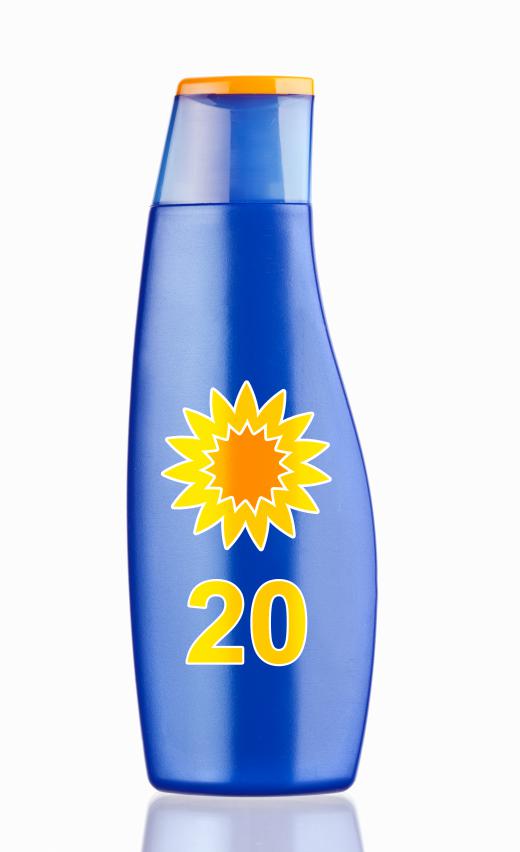What is Zinc?
 Mary McMahon
Mary McMahon
Zinc is a metallic chemical element found in reasonable abundance around the world. It is classified in the transition metals, along with nickel and mercury, among others. The metal is used in a variety of alloys and compounds which have a range of uses, from sunscreen to fine art. Living organisms also rely on it as a valuable nutritional trace element; many foods are excellent sources, including seeds and whole grains.
Pure zinc is a bluish white, lustrous metal. It is extremely brittle at average room temperature, although when it is heated it becomes soft, malleable, and easily worked. When burned, it yields a bright blue to green flame, and the metal is reactive, combining readily with an assortment of other elements. On the periodic table of elements, zinc is identified with the symbol Zn, and the metal has an atomic number of 30.

Humans have been using zinc for thousands of years; the element was used extensively in India in particular. Around the 1500s, it began to be imported into Europe, where it was a costly and unusual metal. Allegedly, zinc was named by Paracelsus, after the German zinke, “jagged,” to describe the way it behaved in a furnace. By the 1700s, several European scientists had managed to isolate the element; there is some dispute over who did it first, although many people give the credit to Andreas Marggraf.

In alloys such as bronze, zinc makes the metal stronger and sometimes easier to work as well. It is also used in solders and in galvanizing. Zinc oxide, a well known compound, is a popular ingredient in sunscreen. Some batteries, pigments, and coins also contain this metal. Humans require around 11 milligrams of zinc each day, most of which they absorb through a variety of foods. A deficiency can lead to hair loss, diarrhea, and sores, while an excess can cause stomach cramps and anemia.

Pure zinc metal is not toxic, but the element should be handled cautiously in some circumstances. The fumes can be toxic for people who work with the metal while it's heated, and free ions can be very dangerous. It is important to wear proper protection when smelting and heating metals in general to reduce exposure to toxic fumes. People who are exposed to too much zinc may have difficulty taking in necessary dietary minerals, as the metal can block absorption. Therefore, excess can lead to substantial health problems if it is not addressed.
AS FEATURED ON:
AS FEATURED ON:
















Discussion Comments
How do you get zinc?
I use Fixodent for my lower dentures. I put it on in the morning and by mid-morning they have come completely out because the Fixodent is gone. So I end up using Fixodent at least four or five times. How dangerous is this and what should I do?
The main ingredient in baby rash cream is zinc oxide. It's an amazing ingredient that works for so many skin conditions. I use it for diaper rash, allergic reactions, sensitivity, sun protection and acne.
Just the other day, my sensitive skin broke out in a rash after using a new face cleanser. My face was so red and it was burning. I applied zinc oxide cream and in five minutes the burning and redness decreased.
Zinc is great for acne as well. People spend so much money for acne products when a baby rash cream with zinc oxide can do the same job.
I don't know how zinc oxide does all this but it must have an anti-inflammatory effect. I recommend all women to keep some zinc oxide cream at home for emergency skin issues. It's a must for me.
@anon52064-- Zinc in its natural state looks like most other metallic elements. It's irregularly shaped and gray.
If you're asking about pure zinc, which is actually not its natural form, it's hard to know what it looks like exactly. Most metals are purified by heating but zinc has a low melting temperature and turns into gas very quickly. But if this pure form could be solidified, it would probably look like crystal particles.
This is really interesting. I didn't know we need zinc for our bodies. But the one in our body and the zinc element in nature are not the same right?
Is zinc a pure substance?
what is zinc made out of?
where did zinc get its name?
how can you die from zinc?
how can one change the molecules of zinc?
Is there another atom number in zinc?
How does zinc conduct electricity?
does zinc have a low boiling point, and does it have a low melting point, or is it brittle or a good conductor of heat?
is zinc a sedimentary rock, metamorphic rock,or an igneous rock?
how was zinc named?
what is really in zinc?
Zinc-- is it toxic?
Can it be eaten?
What is it used for other than metals?
Does it explode?
Does it implode?
Does it have another name other than Zn?
what is zinc's natural state?
How was zinc named?
What can metal zinc be classified as? A non-ferrous metal or a ferrous metal
Where was zinc found, who discovered it and when did they find it?
Zinc is also a trace mineral that we need for our well being. A small amount of zinc is necessary to keep our immune system well. Zinc acts also as an anti aging agent. Good sources of zinc are some nuts, poultry, beans, dairy, some seafood and beef.
how strong and conductive is zinc?
Post your comments